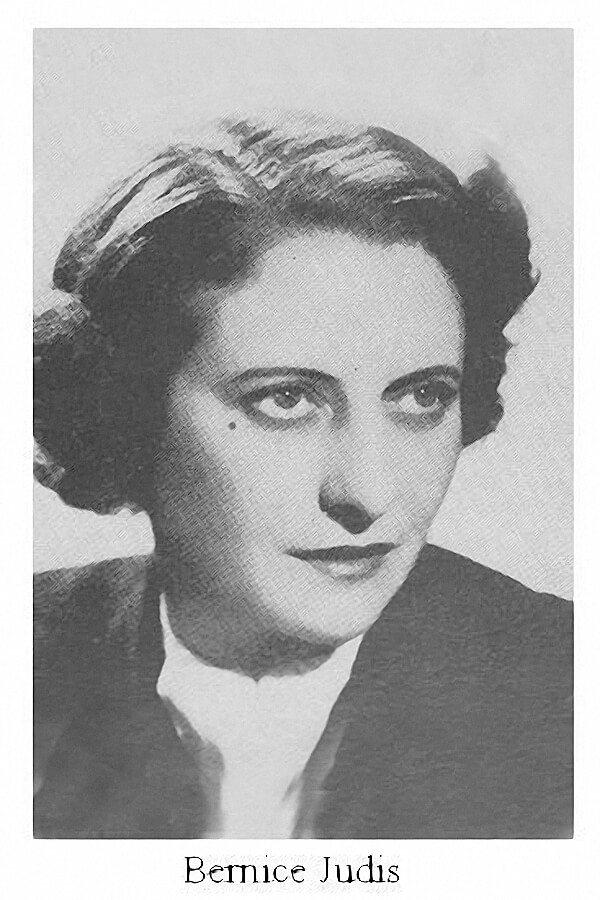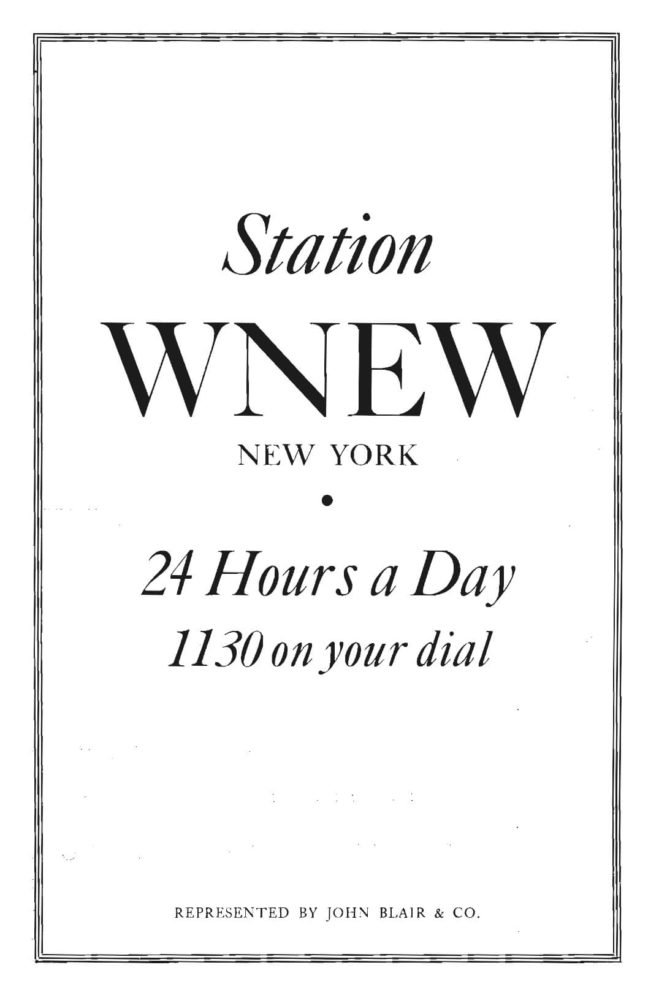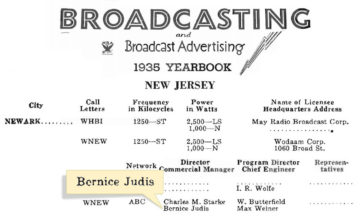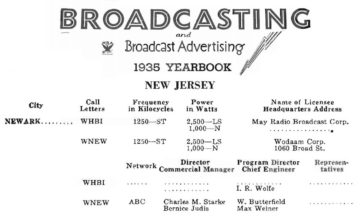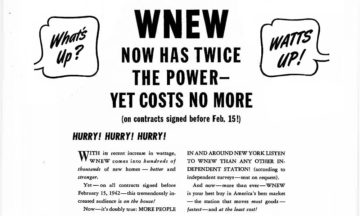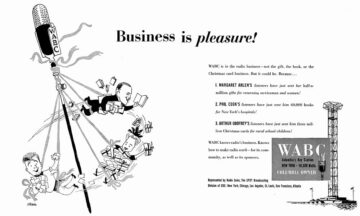This chapter is devoted exclusively to Richard Pack’s 1983 Television-Radio Age article, in which he mostly addresses what you might call Tudie’s “idiosyncrasies.” Read on and enjoy:
Door always open
The door of her large modern office was always open and you could walk in at any time. That was one way she kept in touch. Another was to drop in frequently … for a visit. You’d be pounding away at a press release, and you’d look up and there would be Tudie. She usually had only one thing to say: “So what’s new?”
It was a technique, and it worked. You got to know that you’d better have something to tell her: maybe a new program idea or the beginnings of one, or at least something to report, pro or con, about one of the disc jockeys. It kept you on your toes.
Unlike some other executives I have known in radio, she knew her product, because she listened to the station, really listened, every day and all hours. She never deprecated the basic products — her station’s programs — because she liked radio and WNEW’s brand of radio. Loved it. In fact, she insisted on radios in every office, and keeping them on. To WNEW, naturally. There is a story that she once discovered a secretary listening to WQXR, and nearly fired her. In her Park Avenue apartment, Tudie had eight radios, including one in the bathroom.
Tudie was a stay-up-late and always sampled the Milkman’s Matinee, and other night programming. Poor Art Ford must have thought she hardly ever slept, because by frequent sampling of his show on her own and by checking with her executives, she had him convinced that she was monitoring him all the time.
The Judis technique was this: One of the salesmen, or someone from publicity or programming might say to her casually during the office hours that “I caught Art Ford around 3 a.m. yesterday and he was doing too much chatter … ” Judis would get Art into her office that same day, or call him on the phone, and tell him “Art, I caught you this morning and you’re starting to talk too much again. Cut it out, Art. Play the music!!!”
Theme song
Play the Music! That was a Bernice Judis theme song. She believed in strong air personalities, and d.j.’s were encouraged to personalize themselves with reasonable talk; never too long, but never as short as the formula talk of the top 40 stations. But except for special once-aweek Sunday shows, built around a concept, usually designed for certain sponsors, there was no written copy for d.j.’s. We did have staff writers though — good ones who turned out continuity and scripts for public service and gimmick shows, for the “produced” record shows, and also for a daily halfhour noon variety show with Alyn Edwards as host, plus the WNEW staff orchestra and a vocalist. Bill Kaland, who replaced me as program manager when I left WNEW, was originally a staff writer and turned out amusing stuff for Alyn.
For many years, WNEW continued to maintain a studio orchestra, which had some of the best musicians in town. Teddy Wilson was the pianist, Mundell Lowe on guitar.
Tudie did have a kind of staff meeting, but it was not conventional. It was the famous Bernice Judis “coffee klatsch” (her name for it).
Every morning around 9, Miss Judis, Ira Herbert, the vice president in charge of sales (whom she later married), the salesmen, the program manager, the publicity manager and the chief announcer somehow fitted into a small office adjacent to hers, which had built-in sofas. It was a command performance. If you missed a session, you better have a good excuse.
Was it a business meeting? Well, yes and no and maybe. Some days there would be no shop talk; other mornings would be strictly business, but never long, and no agendas. Usually chitchat or gossip. Judis presided and the conversation was most often cued by her. Sometimes you would think the sessions existed mostly for her amusement, but not really, because there usually was something useful to discuss. She kept things light and lively, something like the hostess of a talk show.
Sometimes her conversation would focus on personal items, about who or what she saw the night before. She had her own cast of characters she liked to talk about, and we knew some of them from their occasional after-hours visit to the station.
She’d say, for instance, “I had dinner last night with the Sondheims. They’re worried about their son Steve. He wants to be a composer.”
Or, “Ira and I went to see Guys and Dolls last night. It’s a marvelous show. You’ve got to see it.” Postscript: “Dick, has the original cast album come in yet? Does Martin have it?”
One of the names she dropped frequently (although Tudie was not a namedropper) was someone not in the gossip and society columns in those days — Jerry Zipkin. She found him amusing and charming, just as apparently a number of women in New York and/or Washington society do these days.
Tudie loved trade gossip, and we all filled her in, although she contributed an item or two, even though she never mixed in broadcasting circles, especially trade organizations.
Her source usually might be one of the trade paper reporters she liked, such as George Rosen of Variety or Jerry Franken of Billboard. A lot of the coffee klatsch bulletins were valuable one way or another for eventual use.
Anyone could contribute to this roundtable, personal stuff if it had some relevance to the business, or reactions to Broadway shows, night clubs, or new radio programs heard, etc. But you’d better not be boring; better to keep quiet.
It was a fast league. If, in a way, we were courtiers keeping the Queen entertained and informed, I must say she never expected any of us to flatter her. And she did not expect, nor did she have, any yes men around her. From the small talk and chitchat she kept alert to whatever was going on at the station and in the industry — instant, non-memo communication among her top people. It was her way, and it would not have worked for anyone else.
Testing place
The coffee klatsch was also a convenient testing place for new executives and salesmen. With her sensitivity and intuition, she could often pick up a clue from the way a man handled himself in the meetings. The Judis intuition sometimes deduced a great deal from a chance remark or reaction. Fair? I’m not sure. But it worked for her.
Although Tudie had the common touch and knew better than anyone how to build a station for the masses, this attractive, smart woman was also occasionally a bit of a snob. As one of Manhattan’s best-dressed women, she was overly concerned about what the men around the shop wore, and she could be caustic. You did not have to wear grey flannels, but the offbeat tie or shirt or suit were frowned upon, or joked about. In the days when seersucker suits were still a novelty, 1 once made the mistake of wearing one, and getting ribbed. “Darling, you are not the preppy type. It doesn’t become you.”
The snobbery took curious turns. In that period, only the upper East Side of town was fashionable. One day, Ted Cott, the dynamic and difficult program vice president, who had been desperately looking for an apartment after his divorce, bounced in bursting with joy. “Hey, I finally got a place!” he told Tudie and the Coffee Court.
“Where is it?” She asked.
“On West End Avenue near Riverside,” Ted said.
“But Teddy dear, you can’t live on the West Side,” Miss Judis proclaimed. “You just can’t.” He didn’t.
Bernice Judis was not a solo act. She surrounded herself with experienced, bright people, and listened to them, depended on them. One of her talents was picking people — not just the on-the-air people — but executives. She paid her top people very well and tried to get the best. But it was a rough, tough league, and some people did not last long. The ones who made it had a kind of tenure, although the pressures never let up. No one stuffy ever survived at WNEW.
It used to be said that almost everyone at WNEW, from Miss Judis down, was something of a character, or “colorful.” I guess you really didn’t have to be a character to succeed there, but at times it helped. Perhaps as a counterpoise to some of the flamboyant characters, Miss Judis had one longtime executive whose judgment she relied on a great deal. His name was John Jaeger and his title was Chief Announcer, a tag which didn’t adequately describe his function or his status.
Judis referred to the stolid Jaeger affectionately as “the squarehead,” because in a household of hip people he could, when necessary, provide a reaction that was more conservative and occasionally wiser. He was a square, but a shrewd one.
The salesmen deserved their fat checks. They were about the best I’ve ever known — in radio or television. Hustling and shrewd, yes, but men who really knew radio and loved it. WNEW was not always an easy sale in the ’40s, and even in the early ’50s. No over-thetransom business for them. They had to fight for orders. On its way up, and for a while during the glory days of big time network radio, WNEW did not always rate too well with Madison Avenue and the major national accounts. Except for clients in The Make Believe Ballroom, and the Rayburn and Finch morning show, most of the best accounts were local; nursed along by canny salesmen from small advertisers into big spenders, like Barney’s, the clothing store.
A note regarding a name mentioned above, John Jaeger. His title changed from time to time, even being listed as News Director at one point. John had a long history with the station, possibly longer even than Tudie’s 20 years. You’ll find his name in the personnel listings from WNEW’s very beginnings … and he may well have come along from one of the predecessor stations.
Next week, we’ll wrap up this legendary station’s story — at least the heyday portion of it — as told by Richard Pack, plus I’ll share a few of my insights as seen from an historical perspective.
Image Credits: Photo of Bernice Judis courtesy of wnew1130com

